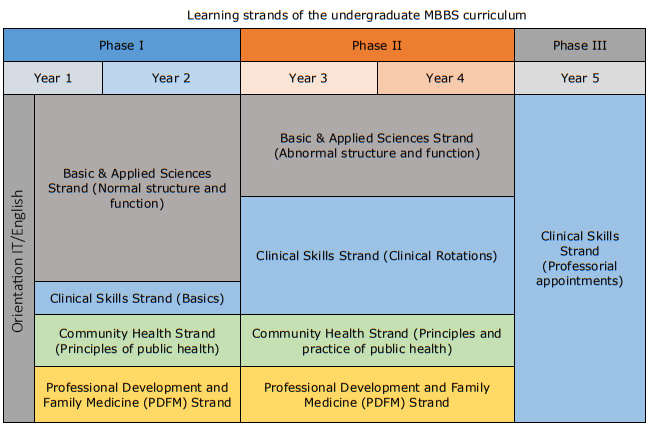
"The Faculty aspires to be an internationally recognised institution of higher education in a culture of excellence and integrity that helps to generate and impart knowledge in the
medical sciences"
University Home | Library | Downloads | FAQs | Contact Us | Submit an Event » e-Learning » IT HelpDesk

From 2004 the faculty has adopted an organ-system based integrated curriculum. The MBBS course run by the Faculty is of five years duration, each academic year consisting of three 10-week terms. The medium of instruction is English. There are three professional examinations at the end of each Phase. The first two years (Phase I) is devoted to study of normal structure and function of the human body. Clinical training commences with the beginning of Phase II in the third year of study. During their third and fourth years, students are expected to do clinical attachments in the mornings, returning to the Faculty premises for lectures, tutorials and laboratory classes in the afternoons.
The clinical attachments cover a wide variety of specialties which include Medicine, Surgery, Paediatrics, Obstetrics & Gynaecology, Psychiatry, Anaesthesiology, Forensic Medicine, Rheumatology, Dermatology, Venereology, Neurology, Cardiology, Ophthalmology, Otolaryngology, Orthopaedic Surgery, Radiology, Family Medicine, Community Medicine and Clinical Pathology. They vary in duration from two weeks to two months. During their fourth year, students carry out supervised research projects in Community Medicine and allied subjects.
During the final year (Phase III), learning is almost entirely hospital-based, with students assigned eight-week clerkships in Medicine, Surgery, Obstetrics & Gynaecology, Paediatrics and Psychiatry in the University units of the Colombo North Teaching Hospital. The Final MBBS examination consists of the disciplines of Medicine, Psychiatry, Surgery, Obstetrics & Gynaecology and Paediatrics.
After passing the Final MBBS examination, students must complete 12 months of internship to obtain full registration to practice medicine in Sri Lanka from the Sri Lanka Medical Council.
The Faculty is listed in the World Directory of Medical Schools and the MBBS degree is recognised by the General Medical Council of the United Kingdom.
The undergraduate on completion of his training period should:
| Year1 |
TERM 1System Based Modules |
TERM 2System Based Modules |
TERM 3System Based Module |
| Year2 |
TERM 4System Based Modules |
TERM 5System Based Modules |
|
| Year3 |
TERM 1System Based Modules |
TERM 2System Based Modules
|
TERM 3System Based Module |
| Research Project | |||
| Year4 |
TERM 4System Based Modules |
TERM 5System Based Modules |
TERM 6System Based Modules |
| Community Health Strand | |||
| Community Attachment | Special Public Health Topics | ||
| Reasearch Project | |||
| Occupational Health | Reproductive Health | ||
| Evidence Based Medicine | |||
| Public Health Clerkships | |||
| Year5 |
Final Year Clinical AppointmentMedicine |

Faculty of Medicine,
University of Kelaniya,
P.O Box 6,
Thalagolla Road,
Ragama,
Sri Lanka
dummy +94 11 2961000
dummy info.med@kln.ac.lk
dummy deanmed@kln.ac.lk